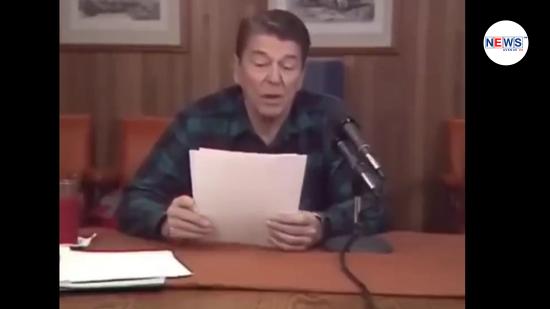
China shares Ronald Reagan’s 1987 video on tariffs in response to US
China pulled up an old video of former United States President Ronald Reagan speaking against tariffs and their adverse effects to criticise the reciprocal tariffs announced by the current US President Donald Trump.
In a video that dates back to 1987, Reagan is heard saying that while imposing tariffs on foreign imports may seem like an act of patriotism and might work at first, it inevitably leads to retaliation by foreign countries and could trigger fierce trade wars.
Ronald Reagan, who was also a Republican, served as the United States’ 40th President from 1981-89. The Chinese Embassy in the US shared the video on X (formerly Twitter) and captioned it, “Ronald Reagan vs. #tariffs : 1987 speech finds new relevance in 2025”.
What Ronald Reagan said in 1987 on tariffs
In the video, Reagan is seen reading from a paper that while imposing tariffs on foreign imports may work for a while, what eventually happens is “first, homegrown industries start relying on government protection in the form of high tariffs, they stop competing, they stop making innovative management and technological changes they need to succeed in the world markets.”
Adding to this, Reagan says that things get worse when the high tariffs inevitably lead to retaliation by foreign countries and could trigger trade wars. “The result is more and more tariffs, higher and higher trade barriers, and less and less competition,” he says.
Because of soaring prices artificially inflated by tariffs, Reagan says that people stop buying, leading to the worst scenario – “markets shrink and collapse, businesses and industries shut down and millions of people lose their jobs.”
US-China tariff war
China has maintained its sharp criticism of the reciprocal tariffs announced by US President Donald Trump during his ‘Liberation Day’ speech on April 2 and retaliated with tariffs on the US.
Trump’s tariffs have triggered a to-and-fro tariff war between China and the US, with both the countries not seemingly backing down.
On April 2, Trump announced 34% tariffs on US imports from China, in addition to the 20% tariffs it announced against China earlier this year over fentanyl trafficking. In response, China also announced 34% tariffs on certain US goods, effective from April 10.
Now, Trump has threatened China with additional 50% tariffs if the latter doesn’t withdraw its reciprocal tariffs by April 8. In a post on his own social media platform Truth Social, Trump posted, “If China does not withdraw its 34 percent increase above their already long-term trading abuses by tomorrow, April 8th, 2025, the United States will impose ADDITIONAL Tariffs on China of 50 percent, effective April 9th.”
“Additionally, all talks with China concerning their requested meetings with us will be terminated! Negotiations with other countries, which have also requested meetings, will begin taking place immediately. Thank you for your attention to this matter!” he added.
In a statement issued on April 5 against the US tariffs, China called Trump’s actions an act of “unilateralism, protectionism and economic bullying”.
China also said that ‘pressuring and threatening’ is not the right way to deal with it. “China has taken and will continue to take resolute measures to safeguard its sovereignty, security, and development interests. China-U.S. economic relations should be mutually beneficial and win-win in nature,” the statement read.
“Development is an inalienable right of all countries, not the exclusive privilege of a few,” it added.





